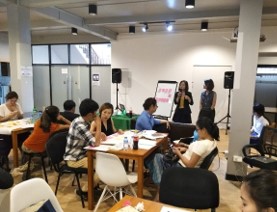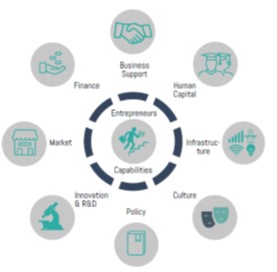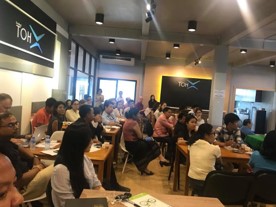Lao’s entrepreneurial ecosystem – new perspectives
The Dutch Good Growth Fund (DGGF), with partners EMC Consulting and Toh Lao Coworking Space (Toh-X), gathered local stakeholders in Vientiane Capital to discuss new perspectives on Lao’s entrepreneurial ecosystem.
On 13 July 2018, the local stakeholders from Lao’s entrepreneurial ecosystem gathered at a workshop in Vientiane Capital to share their appreciation of the strengths and weaknesses of the ecosystem and elaborate together potential solutions to contribute to a more conducive operating environment for local entrepreneurs and their businesses. Over 40 representatives from financial institutions, business associations, development organisations, business support service providers, educators, corporates and entrepreneurs took part in the event.
EMC Consulting was commissioned by the Dutch Good Growth Fund (DGGF) to undertake a study in the Mekong region, covering Cambodia, Lao PDR, Myanmar and Vietnam (#ClosingTheGap Mekong). The DGGF is an initiative of the Dutch Ministry of Foreign Affairs which seeks to improve underserved small and medium-size enterprises’ (SMEs) access to the financial backing they need to grow. The so called “missing middle” are enterprises who have outgrown micro-finance but do not yet have access to regular financial services. The methodology was piloted in Kenya in 2015 and scaled to a regional level in francophone West Africa in 2017 using the Aspen Network of Development Entrepreneurs’ framework for ecosystem assessment. This framework was modified for #ClosingTheGap Mekong by adding entrepreneurs’ capabilities at its centre.
The research approach draws on analysis of existing SME data sets and an extensive literature review, as well as outcomes of interviews undertaken with entrepreneurs, start-ups, and relevant financial and non-financial institutions in the ecosystem. The workshops bring together those stakeholders to review, validate and challenge research findings to date and engage in an interactive session towards elaborating solutions to address gaps identified in the ecosystem.
Conclusions from the workshop are directly captured in the final report and thus inform ecosystem support programs.
Analysis of the World Bank 2016 Enterprise Survey shows that the majority (almost 80%) of all SMEs are both small in size and growing at slow rates. The proportion of high growth businesses is less than 10%, and only 3% employ more than 20 people, the lowest rates of any country in the CTG Mekong study.
Notwithstanding the dominance of traditional SME business models and slow growth in the rural areas, in recent years a small group of successful high-growth start-ups has emerged in Vientiane. This new wave has sparked a wave of interest and enthusiasm in entrepreneurialism which has the potential to gain momentum quickly with the right support.
Local entrepreneurs of all types recognize the need to increase their own ‘entrepreneurial capabilities’, and overcome the skill gap in the labour market, which was categorized as the main constraint to growth. As confirmed during the workshop, they require support to further develop their ideas into business plans and formalize their businesses before being ready to receive external financing.
Participants gathered into small working groups to work on specially developed case studies outlining different profiles of entrepreneurs, at a specific development stage of their business, and with identified needs.
Solutions put forward to increase the conduciveness of the ecosystem to local entrepreneurs and their businesses include:
– Advocate reforms that make it easier to formalize SMEs and start-ups, reducing the current burden of registering with different government agencies through complex procedures and high cost.
– Include entrepreneurial skills in addition to technical skills in the general education system, as well as any donor supported training initiatives, to close the human resource and skill gaps.
– Establish or strengthen an existing entrepreneurial hub to provide much needed incubation / acceleration services such as training workshops, networking events, mentoring, coaching, and seed financing.
– Develop links to regional networks for connecting ecosystem stakeholders to develop their capacity, and encourage experience sharing between entrepreneurs in the region to bring in new ideas for support and advocacy.
The recommendations put forward will be refined and elaborated in the final report #ClosingTheGap Lao PDR which is expected to be finalised by the end of August 2018 and made available to the public through DGGF’s website.
—-
Related posts include:
Not all SMEs in the Mekong region are alike



Comments are closed.